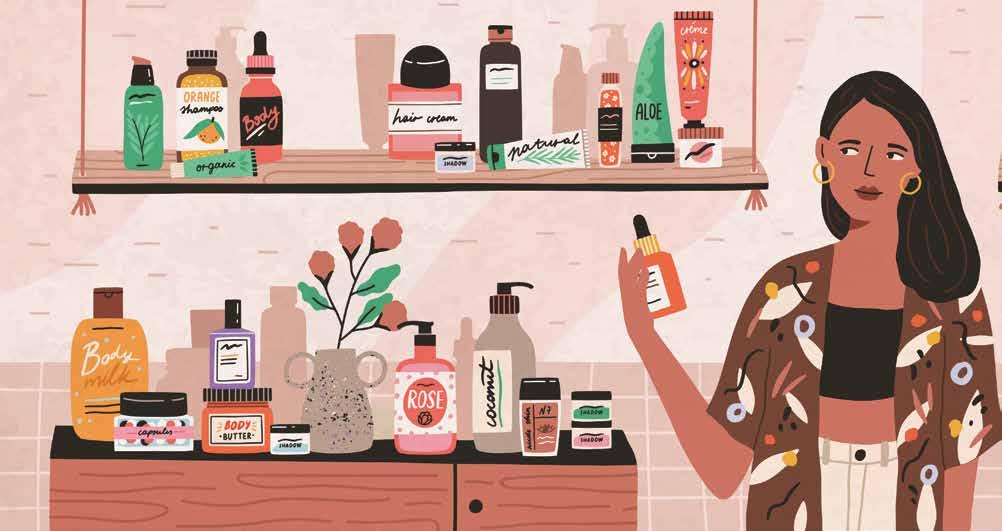
8 minute read
the ns ou s of skin care
by stephanie wallace
Your skin is as unique as you are. Knowing what it needs—and what it doesn’t—can go a long way toward keeping it healthy and vibrant. We’re breaking down popular skin care ingredients to see which offer big boosts for certain skin types—and which are better left on the shelf.
Advertisement
for dry skin …
In
Ceramides: These fatty acids occur naturally in the skin and make up 50% of the outermost layer of your epidermis. They create a barrier that locks in moisture and prevents dryness. In addition to boosting your skin’s hydration, they can strengthen the skin surface to protect against environmental stressors. Ceramides can be used to treat eczema or to help moisturize skin after procedures, such as a laser treatment.
Glycerin: Derived from animal or plant fats, glycerin is a humectant. This means it works by drawing in and retaining moisture to keep skin hydrated. One of the most common ingredients in cosmetics, its other benefits include improving skin barrier function, providing protection against skin irritants and accelerating the wound-healing process.
Shea butter: This ingredient is known for leaving skin as soft as, well, butter. As an emollient, shea butter hydrates the skin and creates a barrier that locks in moisture. It’s also rich in fatty acids, antioxidants and vitamins, which means it also can slow down the breakdown of collagen and improve the texture and appearance of skin. Since it’s an anti-inflammatory, it’s a great option for soothing very dry or irritated skin.
Out
Benzoyl peroxide: This popular acne-fighting ingredient is antibacterial by nature and clears your skin by removing dead skin and excess oil. However, its side effects include redness, dryness and irritation, leading to issues for people who already have dry skin.
Salicylic acid: Extracted from willow tree bark, this chemical exfoliant is not recommended for people with dry skin. Its primary use is treating acne, and one of its biggest benefits is removing excess oil, which can lead to even more dryness. It is a good option for people with oily skin who are looking to treat superficial breakouts, but anyone with dry or sensitive skin would do better to avoid it.
Retinol: There’s no doubt that retinol and retinoids are major players in the skin care world. These vitamin A derivatives can have many benefits, including stimulating collagen and elastin production, which helps keep the skin looking supple and youthful. However they’re also notorious for drying and irritating skin. If you’d still like to try a retinol product, use moisturizer before and after application to create a buffer for your skin.
for oily skin …
In
Glycolic acid: An exfoliating acid derived from sugar cane, glycolic acid is a common acne treatment, but it does so much more. It not only helps you slough off dead skin to expose the newer layers underneath, its small molecule size means that it can penetrate deeper into the skin and stimulate collagen production. Glycolic acid can help with hyperpigmentation, dullness and fine lines and wrinkles.
Niacinamide: Also known as nicotinamide, niacinamide is a form of vitamin B3. It’s not only an essential nutrient for your body, research has shown that its use in skin care may be an effective treatment against acne, hyperpigmentation and eczema. One of its big benefits is helping regulate the production of sebum. Since it also moisturizes, builds keratin and has anti-inflammatory properties, it’s a great choice for oily skin.
Hyaluronic acid: Nowadays, hyaluronic acid is unavoidable as a moisturizing ingredient. It’s naturally found in between collagen bundles in our skin, but it decreases as we age. Applied topically, it can moisturize the skin and provide a temporary plumpness. However, it needs to be used in combination with other moisturizers and works best when applied to damp skin. Be careful about applying it in a dry climate. It works by absorbing moisture and can pull it from deeper layers of the skin if there aren’t other sources.
Out
Occlusives: These hydrating ingredients work by forming a protective layer on your skin that prevents moisture loss. Common examples used in personal care products include petrolatum, silicones, beeswax, squalane and most oils and butters. Since they have a thick consistency, occlusives can often clog pores, which can lead to problems for people with oily or combination skin.
Oleic oils: It may seem like a no-brainer that people with oily skin should avoid using products like face oils. However, not all oils are as likely to clog your pores. Oleic acids are fatty acids produced by the human body and also found in a variety of foods and plants, such as coconut, camellia and hazelnut. They sit on the skin’s surface, so they can be an issue for people with oily skin. If you’d still like to try using a face oil, look for ones with a higher linoleic content, such as rosehip or primrose.
Dimethicone: This silicone is used to make moisturizers silky and is often found in primers because it can fill in fine lines and pores to create a smooth canvas for makeup. Like with occlusives, any ingredient that forms a barrier on the top layer of skin can lead to problems for oily skin, so dimethicone and other silicones should be avoided. If you need a new makeup primer, look for one that is water-based.
for sensitive skin …

In
Green tea: To spill the tea on this ingredient—it’s a skin care superstar! Its active components are called polyphenols, and they have antioxidant anti-inflammatory properties, helping soothe and protect the skin, regulate the production of sebum and minimize the signs of aging. Thanks to caffeine and tannins, green tea also can decrease puffiness. Plus, it’s gentle enough for all skin types.
Aloe vera: We all know that aloe vera is super useful for soothing sunburns, but its skin care uses are vast. Since it’s anti-inflammatory and also antimicrobial, it can be used to treat acne. It also contains aloesin, a compound that has been shown to effectively treat dark spots as well as other forms of hyperpigmentation. Sugars found in the plant called mucopolysaccharides help retain moisture, and aloe vera has further anti-aging benefits because it stimulates the production of hyaluronic acid, collagen and elastin fibers.
Calendula: Also known as the pot marigold, this sunny yellow flower can do big things for your complexion. Thanks to its anti-inflammatory properties, one of calendula’s main benefits is helping to reduce sensitivity and soothe irritation—but that’s not all it can do. It’s rich in skin-friendly oils, so it can help keep skin moisturized, and since it has natural antioxidants, calendula can fight free radical damage.
Out
Fragrance: Whether artificial or an essential oil, fragrance is an ingredient most dermatologists suggest people with sensitive skin avoid. It doesn’t help that skin care labels aren’t required to disclose exactly what is used; it only needs to list ‘fragrance’ among the ingredients. When picking out products, opt for ones labeled ‘fragrance-free.’ Ones called ‘unscented’ can still contain ingredients meant to mask the scent of the product.

Alcohol: As a skin care ingredient, alcohol is often included to make sure products can absorb more quickly. It also can penetrate oil buildup and dissolve dirt, making it a common ingredient for toners. However, it can dry out the skin, leading to more redness and irritation.
Sulfates: The salts of sulfuric acid, sulfates are most commonly used as a cleansing ingredient in skin and hair care. The most common sulfate-based ingredients found in personal care products are sodium lauryl sulfate and sodium laureth sulfate. They both can lead to irritation with continued use, and they can even dry out the skin. &
Most people know us as the Premier Vein Treatment Experts in St. Louis. What people don’t know is that we now offer cutting-edge medical and aesthetic treatments. We are not a traditional medspa; we provide services that harness the tremendous healing capacity of our own body to look and feel better.
We started doing medical aesthetics as an alternative to the ‘Band-Aid medicine’ that we often see in modern health care. Modern medicine is focused on treating a symptom and not the cause. For instance, we all know someone with bad knees. Modern medicine offers them steroid shots, pain meds and eventually a joint replacement. Why not rebuild the knee from inside out using your body’s own healing capabilities? We can help do this using laser technology and your body’s own healing mechanism.

Now consider facial aesthetics. We all know about Botox and fillers. Neither address the underlying mechanism that causes our skin to age. What if we can help your skin rebuild its collagen and volume naturally? “It can be done,” Dr. Vidal Sheen says.
“We offer technology that enables us to address a vast number of medical aesthetic problems, ranging from arthritic issues involving neck, back and joint problems to plantar fasciitis to health issues like erectile dysfunction, stress urinary incontinence and even nail fungus” Sheen adds. “We help your body fix the problem. No steroids, no pills and no surgery.”
Sheen Vein and Cosmetics has always tried to address the underlying issues. This is why we are so highly regarded as a varicose vein treatment facility. We address the venous circulation problem that comes with having vein issues and don’t just put a bandage on it. Sheen Medical Aesthetics is no different.
S IGNATURE ORTHOPEDIC S S T. LOUI S DR. SRI PINNAMANENI, MD
Dr. Sri Pinnamaneni, or Dr. Pinn as he is affectionately known, is a board-certified, fellowship-trained orthopedic surgeon who specializes in treatments of the shoulder and elbow. He has expertise in all arthroscopic and open procedures of the shoulder, including rotator cuff repairs, shoulder stabilization, total shoulder replacements and reverse total shoulder replacements. He also provides comprehensive care of the elbow.
“As I completed my medical training, I found the shoulder joint to be the most fascinating, and I have dedicated my career to understanding and treating shoulder conditions,” Pinnamaneni reflects.
After training at the world-renowned Hospital for Special Surgery in Manhattan, Pinnamaneni brings his first class care to St. Louis. While in training, he helped treat and provided care for professional athletes in the NFL, NHL, NBA and MLS.

Pinnamaneni utilizes cutting edge medical treatments to individualize care. He specializes in NanoScope™ arthroscopy, a single-use camera system using state-of-the-art technology for patients to receive minimally invasive care. “This technology is a game-changer in the shoulder arthroscopy market; it allows a shoulder arthroscopy to be done through an incision the size of the end of a pen,” he remarks. “In the appropriate patient and procedure, it facilitates a more minimally invasive, efficient surgery with a smaller incision and footprint.”
“I am honored to be one of the first surgeons to use and champion this technology in the St. Louis area,” Pinnamaneni adds. “I look forward to providing this minimally invasive, innovative technology to other patients needing shoulder surgery in the community.”
Pinnamaneni and his team also are experts in the field of workers’ compensation care. His team offers a collaborative process to provide efficient and timely treatment to help workers get back to work quicker. This includes scheduling immediate appointments and open communication to adjusters, nurse case managers, employers and the injured worker. “We offer a wide range of services such as independent medical evaluations (IME), ratings, second opinions and medical record reviews,” Pinnamaneni explains.
Pinnamaneni sees patients at numerous Signature Orthopedics locations across the greater St. Louis, and performs surgery at the Frontenac Surgery Center, Old Tesson Surgery Center and St. Luke’s Des Peres Hospital. To schedule an appointment or to learn more, visit sigorthostl.com.









